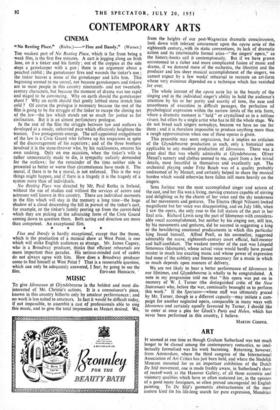MUSIC
Tp give Idomeneo at Glyndebourne is the boldest and most dis- interested of Mr. Christie's actions. It is a connoisseur's piece, known in this country hitherto only by amateur performances ; and no work is less suited to amateurs. In fact it would be difficult today, if not impossible, to assemble a cast of professionals. able to sing this music, and to give the total impression as Mozart desired. We, from the heights of our post-Wagnerian dramatic consciousness, look down with tolerant amusement upon the opera seria of the eighteenth centuryovith its static conventions, its lack of dramatic action and its interminable formal arias—" the singers' opera," as the history-books call it contemptuously. But if we have grown accustomed to a richer and more complicated fusion of music and drama, if we demand more of the orchestra, the librettist and the producer and less sheer musical accomplishment of the singers, we cannot expect by a few weeks' rehearsal to recreate an art-form whose very existence depended on a technique which has vanished for ever.
The whole interest of the opera seria lay in the beauty of the singing and in the individual singer's ability to hold the audience's attention by his or her purity and suavity of tone, the ease and smoothness of execution in difficult passages, the perfection of psychological expression within the narrow limits of the aria form, where a dramatic moment is " held " or crystallised as in a tableau vivant, but often by a single artist who has to fill the whole stage. We do not breed such singers nowadays, because we have no use for them ; and it is therefore impossible to produce anything more than a rough approximation when one of these operas is given.
This preamble may seem ungracious, but it implies no criticism of the Glyndebourne production as such, only a historical note applicable to any modern production of Idomeneo. There was a great deal that was wholly admirable at Glyndebourne. Oliver Messel's scenery and clothes seemed to me, apart from a few trivial details, most beautiful in themselves and excellently apt. The orchestral playing under Fritz Busch was of a quality probably undreamed of by Mozart, and certainly helped to share the musical burden which would otherwise have fallen still more heavily on the singers.
Sena Jurinac was the most accomplished singer and actress of the cast, and her Ilia was a living, moving creature capable of stirring and delighting us by the charm of her voice and the shy tenderness of her movements and gestures. The Electra (Birgit Nilsson) looked magnificent but her voice was disappointing, and on July 14th, when I saw the opera, she only rose to the full stature of the part in her final aria. Richard Lewis sang the part of Idomeneo with considera- able vocal accomplishment, but neither by his singing nor, still less, by his movements and gestures, did he succeed in suggesting a king or the bewildering emotional predicaments in which this particular king found himself. Alfred Poell, as his counsellor, suggested admirably the suave, eighteenth-century court official, half-mentor and half-confidant. The weakest member of the cast was Leopold Simoneau (Idamante), whose actual voice would hardly have passed muster in much less exacting music and whose power of expression had none of the subtlety and finesse necessary for a music in which so much depends upon nuances of delivery.
We are not likely to hear a better performance of Idomeneo in our lifetimes, and Glyndebourne is wholly to be congratulated. A note in my programme told me that " this opera was put on in memory of W. J. Turner (the distinguished critic of the New Statesman) who, before the war, continually besought us to perform this work." If the Spectator—whose staff was ultimately graced by Mr. Turner, though in a different capacity—may initiate a cam- paign for another neglected opera, comparable in many ways with Idomeneo and certainly equally favoured by Turner, I should like to enter at once a plea for Gluck's Paris and Helen, which has never been performed in this country, I believe.
MARTIN COOPER.


































 Previous page
Previous page